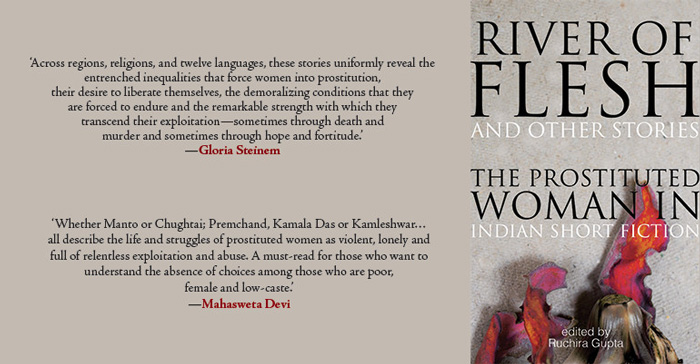Can prostitution be voluntary? A brutal new book says no

Those outside the world of prostitution often speak about it in conceptual terms. However, here are some facts.
- Ice is used to physically break pre-pubescent girls and introduce them into prostitution.
- They are put through a process known as "seasoning", in which they are beaten, starved, drugged.
- The girls are raped by 8 to 10 male customers every day.
This is an inarguable reality of prostitution.
But then there are theories. That prostitution is empowering. That it is a livelihood choice among other unequal choices available to women. That it should be defined as work and prostituted women should be called sex workers.
Also read - I believe in creating alternatives to sex work, not moral policing: Swati Maliwal
When Ruchira Gupta, an anti-sex trafficking campaigner, saw mutilated bodies, bottles shoved up vaginas, scars of cigarette butts on breasts - she wasn't sure if those who championed the cause of "sex workers" genuinely wished them well or were merely protecting the status quo.
At this point she took to reading short stories on prostitution by literary greats. From Amrita Pritam to Ismat Chughtai, from Premchand to Nabendu Ghosh. Each offering a harsh indictment of this practice of human slavery. Reaffirming her belief in the absence of choices for these women.
River of Flesh & Other Stories
Five years later, Gupta is publishing an anthology on the trafficked, prostituted woman in Indian short fiction. It has stories translated into the English language from 12 languages.
"All the stories reveal the commonalities among the inequalities of women across our sub-continent. All reveal the low self-esteem, incompleteness, emptiness, self-doubt and self-hatred that comes from being the oppressed," Gupta writes in the book.
Premchand's heroine prostitutes herself to shame her husband. Saadat Hasan Manto's heroine murders her pimp knowing that she will be caught and punished. Indira Goswami's heroine walks out naked from her lover's coffin. And Amrita's Pritam's concubine sings at her lover's son's wedding in the presence of his wife and family.
"Every story reveals the absence of choices prostituted women and their un-prostituted sisters face in and outside marriage."
Fact & Fiction

Courtesy: Speaking Tiger
Gupta, a professor of journalism at New York University, is the founder of Apne Aap Women Worldwide, an anti-sex trafficking organisation. She has helped more than 20,000 women in India exit prostitution systems.
"I came to know of the huge profits that pimps and brothel-keepers make. I saw girls and women chewed up and spit out by the brothel system. I met women in their early thirties who had been thrown out of brothels because they were no longer commercially viable - customers constantly demand 'fresh meat'."
The girls are forced to stand on the streets for long hours to attract customers for themselves or for older women. They suffer from sleep deprivation and insomnia. The women have internalised the violence inflicted on their bodies to such an extent that they deny having faced any.
"The physical and mental consequences of the repeated body invasion that prostituted women face is so extreme that these girls and women suffer from higher rates of psycho-social trauma than even war veterans."
Thriving on prostitution
Dalit writer Baburao Bagul describes the dehumanising way in which a shopkeeper treats a low-caste prostituted woman who tries to earn money to visit her sick son. Indira Goswami's heroine lives in abject poverty to honour the promise of marriage made by her high-caste lover and Amrita Pritam's heroine comes from the Kanjar tribe - known officially as a 'Denotified Criminal Tribe'.
Bengali writer Bibhutibhushan Bandyopadhyay describes the friendship between a low-caste prostituted woman and a Brahmin child, and Kamleshwar's protagonist is a low-caste woman, whose very body begins to smell from her illnesses, yet continues to be exploited.
The title of the book has been drawn from a story by Kamleshwar. It's a story where men live off the earnings of prostituted women. Women in Saadat Hasan Manto's story The Hundred-Candle-Power Bulb also thrive on prostitution.
In some other stories such as Market Price by Nabendu Ghosh and Kalindi by Manisha Kulshreshtha, men depend on women for their very existence.
The systematic abuse by customers, pimps, brothel-keepers, lovers, husbands and recruiters is documented in the 21 stories that were chosen for the book.
Demystifying the prostitute
It may or not be the world's oldest profession, but Gupta will not have it listed as a choice for women.
"The term sex-worker cannot erase the trauma of body-invasion. Nor can any kind of legislation do away with the shock of body penetration... Women do not choose prostitution, they are prostituted."
Some stories are chilling. Like that of 16-year-old Kani, a rag picker, who was forced into prostitution and was found dead on the road for The Last Customer - a vulture.
"Everyone was on the move. No one had time to stop. Someone said the municipal van would come by to pick up the corpse. Up above the skies, a vulture circled, and spiralled down. Kani lay with her eyes open, as if keenly eyeing it. The vulture was slowly closing in to alight upon her - the last customer."
Others are subtle. Like Qurratulain Haider's Ancestry. The story of Chhammi Begum, an upright woman born into a zamindar's family who ends up as a domestic help in a "madam's house in Mumbai."
"As she was still pondering whether to welcome her guests with tea or water, the fat man wearing gold buttons and diamond rings inquired brusquely: 'Where is Madam?' Chhammi Begum knew well that in English, 'Madam' meant 'Begum'. She replied: 'Madam has gone out.' 'Where have the wretched chokri log gone?'"
Gupta's book is an attempt to "de-normalise" the efforts to legitimise the exploitation of women. No easy task that.
......
Book: River of Flesh and Other Stories
Author: Ruchira Gupta; Publisher: Speaking Tiger
Price: Rs 350; Pages: 256
More in Catch - Policy to de-criminalise sex trade approved by Amnesty International
Loans, prostitution & politics: The 'call money racket' raging in Andhra







![BJP's Kapil Mishra recreates Shankar Mahadevan’s ‘Breathless’ song to highlight Delhi pollution [WATCH] BJP's Kapil Mishra recreates Shankar Mahadevan’s ‘Breathless’ song to highlight Delhi pollution [WATCH]](https://images.catchnews.com/upload/2022/11/03/kapil-mishra_240884_300x172.png)

![Anupam Kher shares pictures of his toned body on 67th birthday [MUST SEE] Anupam Kher shares pictures of his toned body on 67th birthday [MUST SEE]](https://images.catchnews.com/upload/2022/03/07/Anupam_kher_231145_300x172.jpg)






_in_Assams_Dibrugarh_(Photo_257977_1600x1200.jpg)